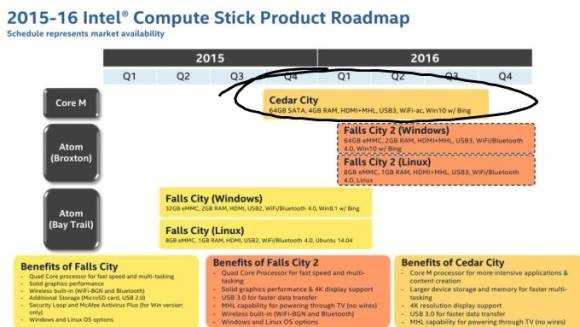A Core M-based Intel Compute Stick will be launched later this year and by including SATA storage and MHL it will solve a couple of issues that the current Atom-based stick has. Cedar City,as it is codenamed, and Windows 10 could make the ultimate streaming solution.
The current Intel Compute Stick is about as ultra-mobile as you can get. Plug it into a USB power pack, and then into a monitor and you’re good to go. OK, the screen part of that equation might not be optimal but there are still a number of scenarios that work. Home theatre, remote desktop, NAS, Web server, WiFi / 3G hotspot etc. There’s a couple of issues with the current Atom Baytrail-T version though. It’s got a 32-bit UEFI Bootloader which isn’t Linux friendly, it’s not very powerful and it’s got relatively slow eMMC storage. Cedar City will solve all those problems.
Don’t expect this to be fanless and don’t expect it to be small (take a look at the Liva Core to see how small a fanless Core M mini PC can get) and don’t expect this to be cheap either. Core M commands at least a $100 premium over Atom and the SATA storage will be more expensive than eMMC but for portable mainstream computing scenarios this could be as compact as it will get. Note too that the MHL specification is mentioned which means (if it uses the latest version and perhaps a USB-C connector) it can be powered by the connected screen. Micro USB won’t be able to give enough power.
‘Core M’ also means this could be the up-coming Skylake version which means even more power, efficiency and features.
- Processor: Intel Core M
- RAM: 4GB
- Storage: 64GB, SATA SSD.
- Connections: USB 3.0 (Micro SD and other interfaces might also be included.)
- WiFi: 802.11ac WiFi (and Bluetooth 4.0 we assume)
- MHL (SuperMHL?) support.
Core M supports 4K displays and the Quick Sync video hardware should be able to accelerate HEVC and VP9 decoding under Windows 10. I would expect WiDi support too so given the improved casting features in Windows 10 it could make the ultimate all-round streaming box supporting DIAL, DNLA, Miracast and WiDi.
Source: Liliputing.











